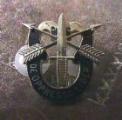It's really this sort of stuff which, if true, really alarms me since it cuts against just about everything that I thought we we trying to understand about Afghanistan. If the Helmand governor delivers decent governance to the people of the province and its districts, and what he says matters, then all's good and well. But if the residents of Marjeh and similar locales could care less about central government because it cannot deliver on essential services and merely doles out benefits via patronage, leading folks to weather much of live alone, then we will have to do twice as much work to bring anyone under the fold.A key challenge for the stabilisation team and Marine commanders will be transforming Zahir, who does not hail from Marjah and knows few people there, into an influential local figure. Helmand provincial governor Gulab Mangal selected him for the post largely because he is a friend, but in meetings of tribal elders before the operation, he was primarily a backbencher.
This goes back to my head-scratching over just what we are trying to accomplish when there are pretty strong arguments against hoping to synch a centralized government structure in with pretty resilient and independent tribal structures that are already taking care of themselves in ways they know how to do best.
It also makes me wonder what the back story is on this guy, and what other reasons there are (besides the Helmand Governor connection) for him to be THAT GUY who is purportedly right for the job.
My last deploy, we had a town on the edge of the Arab belt on the fringe of the Kurdish patch in Ninevah Province. Bulayj was a relatively sleepy town by that time, with not much in the way or insurgent pockets that could really influence anything. The town had a mayor, but he lived in a town several dozen miles to the north, and he rarely visited anymore, despite his official position, due to a fear of violence. So we had a sheikh to deal with, and he was all about pointing a finger at Maj Mohammed, the police chief, who in turn would offer a slight smile and such his teeth when the topic of the sheikh came up. Meanwhile the band played on, and the shopkeepers sold their wares and the black market benzine peddlers doled out portions from rusted drums on the fringe of town.
Makes me wonder if we need less of governors and mayors in some of these corners of the world, and would do better thinking along the lines of CEOs and COOs. After all, don't we routinely complain about politicians as generally being unable to influence our personal bottom line?













Bookmarks